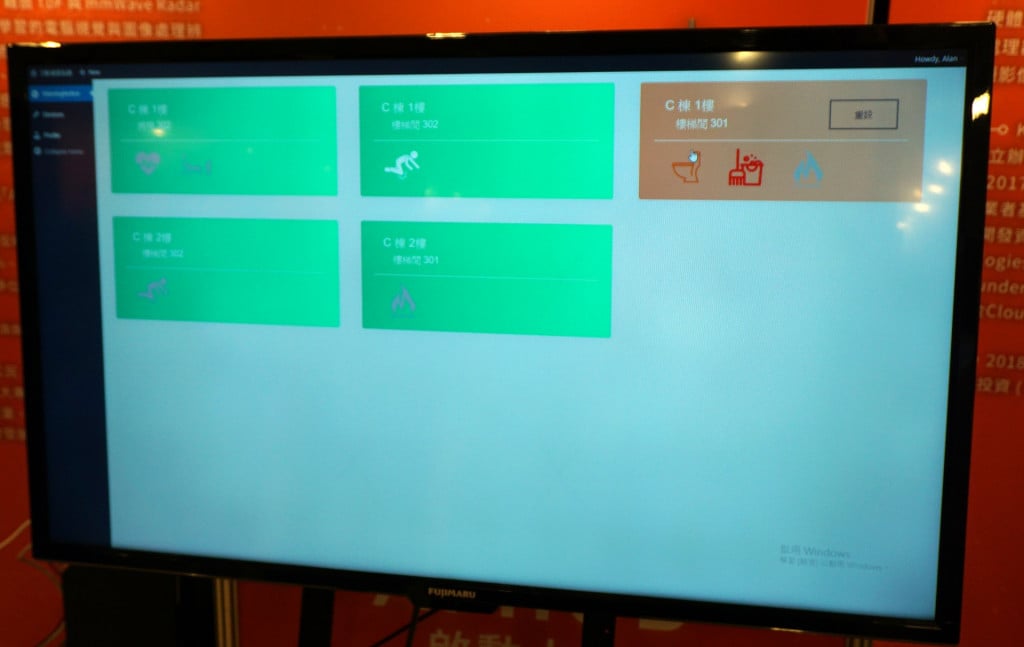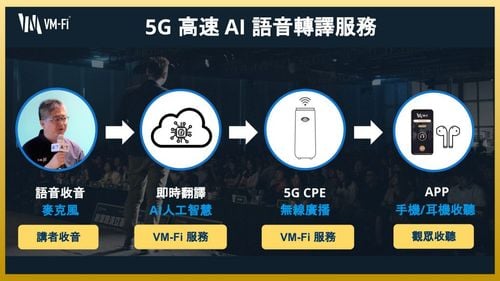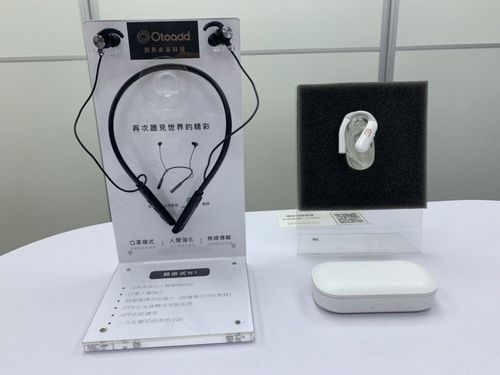VM-Fi launches killer 5G real-time AI voice translator that reduces interpretation costs by 50%
With "Voice as a Service VaaS", VM-Fi Inc launched the world's leading 5G real-time AI voice translation service "VM-Fi," providing AI real-time translation subtitles TranSpeech and AI multi-lingual smart counter TransDisplay The service is applied to real-time translation services in diverse fields, such as international exhibitions, tourism industry, and retail stores The translation service can be quickly set up in 15 minutes, which can significantly reduce the customer's interpretation service cost by 50, creating benefits in terms of time and labor costs This killer application is a product launched by VM-Fi, which has been established for three years It can significantly reduce the cost of interpretation by half It successfully entered the Japanese market and is highly popular among consumers
TranSpeech real-time subtitles for speeches and TransDisplay smart counter AI service solution
For organizers of international forums and exhibitions, paying high interpretation fees has always been a common pain point hard to put into words According to statistics, to hold an all-English forum in Taiwan, including two interpreters, setting up an interpretation booth, on-site radio station, control panel, and audio, the total cost will be at least NT100,000 to meet the on-site interpretation needs
Established in September 2020, VM-Fi launched the "VM-Fi 5G real-time AI voice translation service" In just 2 years, and successively won the Mobileheroes of the Ministry of Economic Affairs Industrial Development Bureau, Start-up competition in the Smart City Project, Qualcomm Innovate in Taiwan Challenge QITC, Japan's JR Kyushu Innovative Business Competition Excellence Award, and the CES 2022 Innovation Award It has not only received praises in the market, but also attracted great attention from Taiwanese investors and was adopted by large Japanese trading companies It hopes to help people around the world avoid communication barriers through smart city solutions, and enjoy a convenient life in smart cities
5G real-time AI voice translation does not require expensive interpreters and equipment and reduces the interpretation cost by 50
The VM-Fi team, which has a solid technical foundation in language translation, digital content, and UX development, has learned that only 20 of high-end consumers in the market can afford the high cost of interpretation To meet the remaining 80 of market demand, VM-Fi combines 5G high-speed transmission and AI voice recognition technology help customers reduce labor and costs Its business solutions can be applied in international exhibitions, tourism services, shopping malls, and online and offline business meetings
5G high-speed AI speech translation service process
"Unlike traditional interpreters' sentence-by-sentence interpretation, which is a time-consuming and inefficient process that prevents the audience from smoothly listening to a speech," VM-Fi further stated that the real-time AI speech translation service uses AI algorithms to analyze the speakers speech The AI determines the parts of speech and subject of the speaker, and then immediately translates it The lecturer does not need to wait for the interpreter, and only needs to connect the microphone cable to the VM-Fi 5G real-time AI voice translation service to speak freely The audience can immediately read the translated subtitles
5G real-time AI voice translation was used in the Kyoto Smart City Summit amp Expo for two consecutive years in 2022-2023
The "VM-Fi 5G real-time AI voice translation service" currently supports Chinese, English, Japanese, Korean, Spanish, French, and German, providing translation services between these seven languages During the pandemic, when the demand for online activities increased significantly, VM-Fi introduced the world's first real-time subtitle service solution The contents spoken by the foreign speaker is translated in real-time and displayed on the live broadcast screen, allowing the audience to understand contents shared by the speaker in real time The operation method is also very simple Audiences do not need to download the APP All they need to do is open the Youtube or Facebook live broadcast platforms provided by the organizer The real-time subtitle solution not only saves customers the trouble of translation work, but also allows online listeners to enjoy seamless real-time translation services without any worries
Real-time subtitles provide audiences with seamless real-time translation service
In addition, the smart counter solution TransDisplay launched by VM-Fi in Japan is also very popular among consumers VM-Fi stated that Japan has a large elderly population and a large number of tourists Especially during the pandemic, most consumers wore masks and there was often a gap in communication The smart counter directly converts the communication between two parties from voice to text and displays on the transparent partition, providing the most considerate service that the public can clearly see at a glance In the future, VM-Fi will work with Taiwanese panel manufacturers, integrating software and hardware to provide voice-to-real-time subtitle translation services in Japanrsquos shopping malls, stations, airports, and government agencies
Smart counters provided people with friendly communication services during the pandemic
User experience is the key to VM-Fi taking root in the Japanese market
Facing the explosive growth of cross-border tourism business opportunities after the pandemic, VM-Fi is confident in business expansion VM-Fi stated that the VM-Fi 5G real-time AI voice translation service has demonstrated excellent product and service resilience during the pandemic, and can flexibly meet customer needs for various physical or online services VM-Fi plans to establish a headquarters in Japan before April 2025, and actively cooperates with Kansai and Kyoto prefectural and municipal governments to expand its operations After establishing a solid foundation in the Japanese market, the EU market will be the next important target
VM-Fi participated in fundraising activities of the AI Founders Alliance of the AI Program of the Industrial Development Bureau, Ministry of Economic Affairs The company relied on the assistance of the Institute for Information Technology III, Taiwan-Japan Industrial Collaboration Promotion Office TJPO, and the Japan External Trade Organization JETRO to actively seize Japan's market "Japan's market not only values digital transformation, but also user experience UX" Therefore, after the successful launch in Japan, everything will fall into place when it expands to other markets around the world
VM-Fi app in Japan's shopping malls, stations, airports, and government agencies
VM-Fi is a startup with passion and innovative spirit nbspfounded in 2020 We focus on AI speech recognition and real-time translation technologies, and are committed to allowing people around the world to enjoy high-speed speech translation during international speeches, at service counters, and during communication, completely removing the language barrier and allowing everyone to enjoy equal rights to information
VM-Fi's AI service is not only a technological innovation, but also a commitment to global sustainable development A Digital solutions We are committed to reducing paper use Every sheet of A4 paper saved reduces carbon emissions by 78 grams, using practical digital solutions to promote environmental protection B Renewable energy decisions We choose cloud services that use renewable energy and plan to achieve the goal of using cloud services that use 100 renewable energy by 2025, in order to create a greener technology foundation for the future C Water saving decisions We are committed to using cloud services that achieve positive water benefits before 2030, ensuring that the replenishment of water resources exceeds consumption, and contributing to the future of the Earth D Net zero emission decisions When using new data centers, we will choose net-zero deforestation to protect the natural environment E Sustainable development goals Through the decisions above, we are making active efforts to achieve the United Nations Sustainable Development Goals SDGs 4, 7, 9, 10, 11, and 13, exerting every effort to create a better world
VM-Fi's vision is to create a world without communication barriers, allowing everyone to communicate freely and jointly move toward a better future Let us work together to contribute to global communication equality and sustainable development, and create a greener and better future
nbsp






